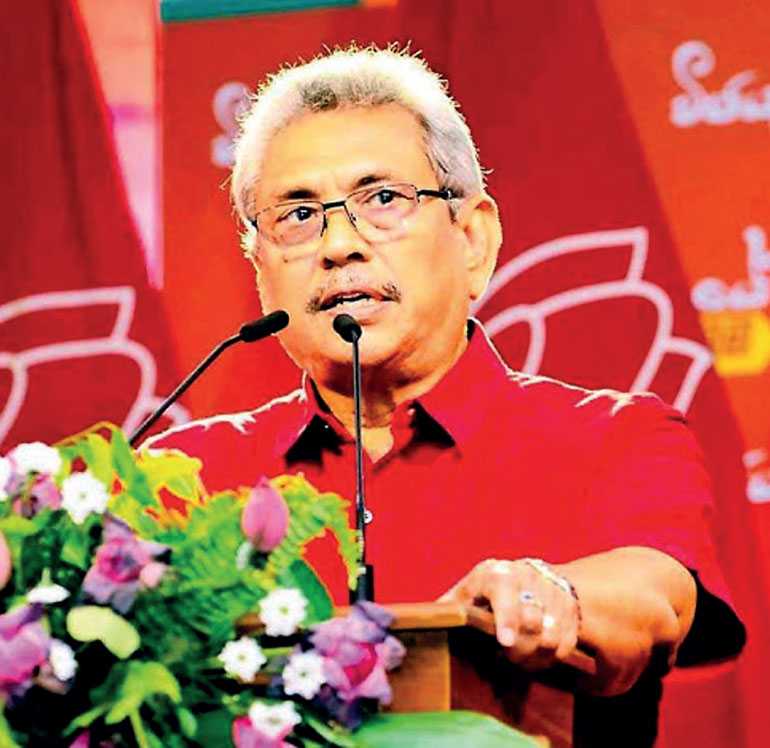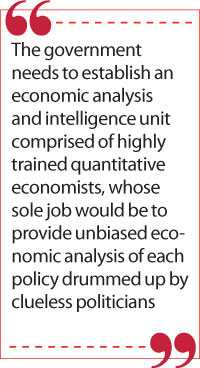Wednesday Feb 18, 2026
Wednesday Feb 18, 2026
Monday, 6 July 2020 00:16 - - {{hitsCtrl.values.hits}}

While the President’s umbrage towards highly paid errant officials may be justified, facetious recommendations are likely to make the situation worse
“We have left undone those things which we ought to have done; and we had done those things which we ought not to have done” – Book of Common Prayer: General Confession.
By Dr. Sirimewan Dharmaratne
The President’s recent opprobrium of top Central Bank officials is a manifestation of how decadent government policy making process has become. It is perturbing, a policy that could have serious implications on reviving a faltering economy was formulated in haste. This initiative, which worrying lacks substance, at the outset appears to be nothing more than handing out vast amounts of printed money to yet unspecified purposes and individuals at a hugely discounted rate. Hopefully, this policy has been well-designed, and the proper usage of disbursed funds and subsequent monitoring has been envisaged and factored in.
Costing government policy
In an earlier post on this forum, I explained how government policy should be formulated and properly costed. It is unlikely that most of the projects that are proposed or ongoing would pass any sort of thorough financial analysis yet alone an economic analysis. Their profitability even from a financial aspect seems highly suspect. Most projects appear to be for obtaining, cheap credit, tax reliefs, acquire land, write-off tax or to launder money. It would be interesting and enlightening to retrospectively evaluate at least some of the projects to see how many have delivered stipulated benefits.
What are real costs?
The real difficulty is in costing the so called ‘non-markable’ goods and services. Every time an acre of virgin forest is cleared, a mangrove tree is cut, or a cubic meter of sand is dredged, there is a cost on the society that is not considered in standard financial analysis. These costs, as well as the opportunity cost of subsidised credit, tax breaks, and other pecuniary cost should be included in an economic analysis.
In this aspect, a major problem that Sri Lanka has is the absence of value of its natural resources and environmental goods. Almost daily there are reports of wanton and egregious desecration of the environment in the name of development. The public has become inured to horror stories. While the destruction of environment may create strong emotions in many, the impact is more profound when that loss is quantified.
Techniques for valuation of natural resources have been proposed and perfected over the last 50 years or so. Valuing ‘invaluable’ natural resources and environmental goods has yielded surprising outcomes all over the world and has influenced or changed lot of ‘development’ activities. Some such valuations have led to significant compensation for damage or has led to criminal prosecutions. Probably and more importantly, such valuation has resulted in more environmentally friendly alternatives. 
In Sri Lanka, where pristine environment is rapidly becoming a premium good, it is time for the government to put a moratorium on all development activities which involve environmentally sensitive or important areas until proper valuation methods are in place. These must include all mangroves, virgin forests, sand banks and dunes, and any other areas identified by a proper environmental authority. I believe there is enough arable land that is already unutilised or underutilised, which could easily meet the food requirement of the populace. What is needed is not to bring more land under cultivation but use the existing land intensively and efficiently.
Establishing a government economic service
The government needs to establish an economic analysis and intelligence unit comprised of highly trained quantitative economists, whose sole job would be to provide unbiased economic analysis of each policy drummed up by clueless politicians. This unit must include biologists, environmental scientists, geologists and professionals from other related fields, who would feed in objective quantitative data that could be used for costing. For example, fisheries biologists have been able to quantify the relationship between fisheries nurseries in mangroves and the pelagic fish catch.
Similarly, the function of mangroves as buffer zones has been widely studied and quantified. This needs not be a daunting task. Not every meter of mangrove or every acre of forest need be valued. Technically sound valuation of one area could be justifiably extrapolated to similar areas. Then there is a plethora of published work from all over the world, and work done by institutions such as the World Bank that could be used under justifiable conditions.
Economic advice to the president and the government in general should be taken over by professionals who are conversant in modern economic methods and tools. Old school economists, with training in areas development economics, economic history and such descriptive fields will not be able to provide required analytical support. A government economist’s job is not to recommend unfunded tax cuts, suggest nonsensical changes to tax regimes or to recommend cheap credit. Each policy recommendation should be accompanied by a properly costed scorecard that tells the president why it is better than an alternative or the ‘do nothing’ scenario.
Economic tools impose a minimum cost of the society when they are least distortionary. Such tools cannot be formulated in haste, especially when one is under pressure ‘to do something’. While the President’s umbrage towards highly paid errant officials may be justified, facetious recommendations are likely to make the situation worse. After the impending change in the government, there needs to be a large-scale overhaul of the public services. The government should be modernised with professionals who would be able to provide evidence based policy solutions, properly costed and funded. The President may need to look far afield to assemble a team who are not content with sitting on their real or perceived laurels, but who are prepared to get up the next day and prove themselves all over again.
(Author is a senior analyst at HM Revenue and Customs, UK.)